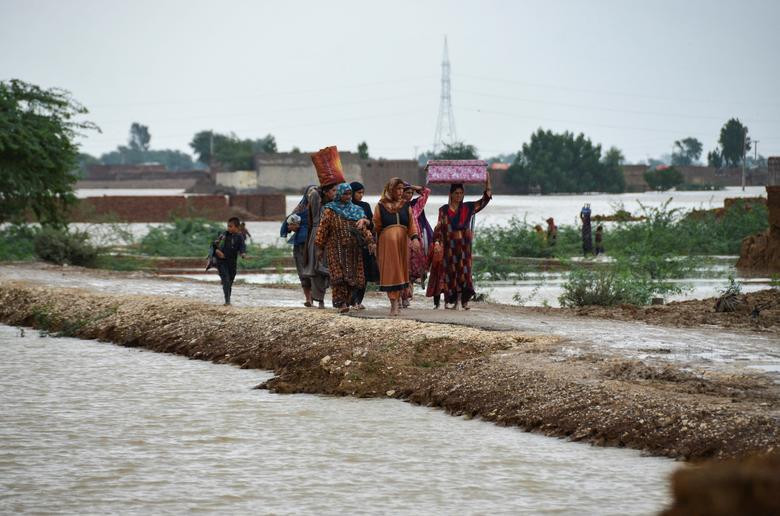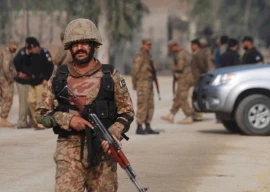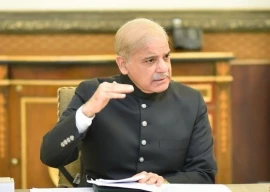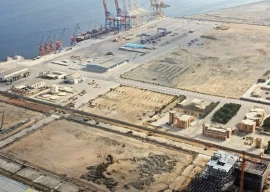
Pakistan’s political crisis couldn’t have come at a worse time. With the record monsoon rains triggering a catastrophe of epic scale, high-pitched political feuding took the spotlight off the millions of hapless souls left at the mercy of raging waters.
The unprecedented flooding has affected more than 30 million people over the last few weeks in the “climate-induced humanitarian disaster of epic proportions”. Yet, petty politics overshadowed efforts to deal with the country’s worst catastrophe.
According to political and environmental experts, both the government as well as the opposition were not just caught napping, but also took a lot of time to wake up to the horrible calamity.
There is a growing sense that even when those at the helm of affairs took the pains of acting at the last minute, the “cosmetic measures” amounted to nothing and only served to lull people into the suicidal belief that their "messiahs" had averted the worst.
The experts say that the populist rhetoric has hurt economic reforms, investors’ confidence and coordinated relief efforts for flood-affected populations, saying a more responsive system of governance was required instead of just waiting for a disaster to take place and then crying over spilt milk.
“Pakistan’s elite including political, judiciary and military are embroiled in a bitter power struggle which has disconnected them from the masses,” PPP Senator Mustafa Nawaz Khokhar said, “Media can’t absolve itself either.”
In the game of attracting eyeballs, the PPP stalwart said, newsrooms seem to be more concerned with who said what. “In this age of science where weather patterns and incidents can be predicted months in advance,” Khokhar said, “having missed it altogether and making no preparations in advance has exposed our misplaced priorities.”
Former chairman Board of Investment (BoI), Haroon Sharif, said that the “populist and intense politics in Pakistan is hurting the economic reforms, investor confidence and coordinated relief efforts for flood affected population.” Sharif said that the “top leadership needs to rise above petty point scoring and get serious about rehabilitating people and revive the economy through structural reforms.”
For him, this is only possible if the delegation of power is done to key institutions to create space for professionals to replace bureaucrats.
Political analyst and renowned journalist Mazhar Abbas regretted that the general behaviour of the governments and the people was that they react instead of timely acting; saying “we wait for a tragedy and this is our overall behaviour”.
After the 2010 floods, Abbas said, the governments should have been prepared to deal with such kind of situation; they should have never allowed people to build houses and hotels near rivers or canals, saying all those who have given NOC for construction in such areas should be held responsible.
“Political parties are responsible for the current situation because their respective governments are responsible for good governance instead of waiting for a disaster to take place,” Abbas said, adding the losses could have been reduced by 50 per cent had there been proper preparation.
“We wait for a disaster every year,” he regretted. On politicians’ rhetoric and optics, Abbas said that they prefer playing with TV screens without realising what message was being given to the people. “The cosmetic expression and concerns are for short period; we haven’t grown as a nation,” he said.
Political analyst and columnist Mosharraf Zaidi said that “there is an enormous cost in Pakistani political discourse failing to prioritize the floods.” The political expert said that the global humanitarian responses have been slowed and funding has depleted owing to the Russian invasion of Ukraine and escalating costs and timelines for shipping.
“Any delays in identifying and appealing for global humanitarian support will badly hamper rescue and relief efforts,” Zaidi warned. He said that Pakistan was already in the grip of a major inflationary spike and the floods will make survival difficult for communities whose homes, livestock and lands have been flooded.
Sara Hayat, a climate change specialist, said that the monsoon rains are expected every year in Pakistan and the country was expecting them this year too but the government was not prepared, saying the point that should be really harped on is that the number of casualties would have been far less had there been some kind of preparation.
Annually, the climate change expert said, Pakistan experiences flooding of some kind or the other and had the governments prepared in advance, the number of casualties of humans and livestock would have been reduced and the evacuation process could have been expedited and preplanned.
“Amid the political instability,” Sara said, “the attention was not on the real issues plaguing the country, including the climate-change-induced flooding.”
The other thing that she stressed was that the damage and casualties caused by the rains were not just because of climate change, saying they were also because of “poor planning” and because of “encroachment on flood-sensitive or flood vulnerable areas” like the buildings that have collapsed in various parts of Khyber-Pakhtunkhwa.
“They should never have been constructed in those areas, to begin with,” Sara said, “the people who gave permits and licenses should be held responsible for it.” Similarly, she said, crops should never be cultivated in flood-sensitive areas as this is one of the reasons Pakistan suffered such extreme loss of cotton and date crops, among others, in Balochistan and Sindh because people were permitted to live in areas where they should never have been allowed to settle.
As soon as the situation subsides a little, Sara said, the governments should conduct floodplain surveys to avoid these kinds of casualties, damage and loss of lives and livelihood in the future.
“Floodplain assessments should be conducted and people must not be allowed to settle in or grow crops or construct in areas that are vulnerable to floods,” she concluded.
Renowned lawyer Salman Akram Raja summed up the current situation as accurately as possible in one of his tweets.
"We are facing the largest dislocation of people, animals & food stocks since 1947," Raja said, saying "we let down the East Pakistanis during the 1970 cyclone." Expressing that it was our test as a nation all over again, Raja questioned, "Will we find the unity, focus and resolve to rebuild lives", saying "we need real leadership."




1678644860-0/image_2023-03-12_23_08_11-(1)1678644860-0-270x192.webp)


1661619996-0/03-(4)1661619996-0-270x192.webp)














COMMENTS
Comments are moderated and generally will be posted if they are on-topic and not abusive.
For more information, please see our Comments FAQ